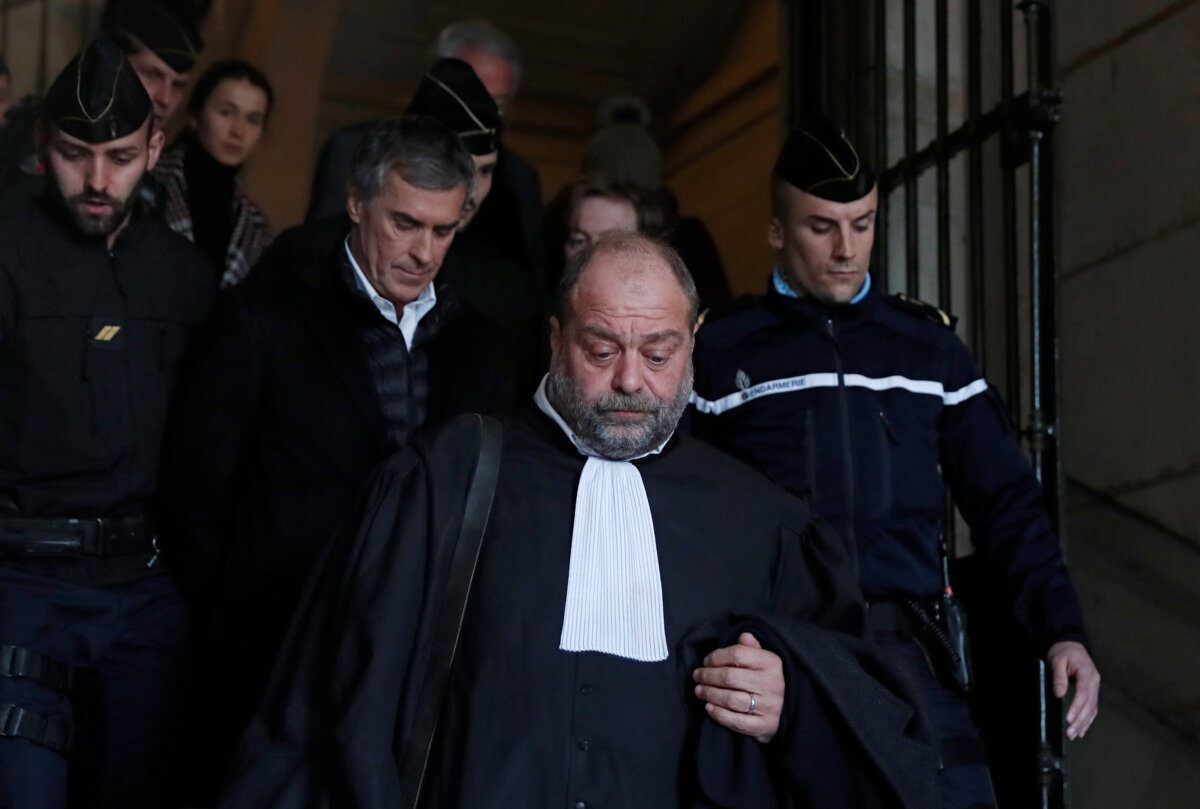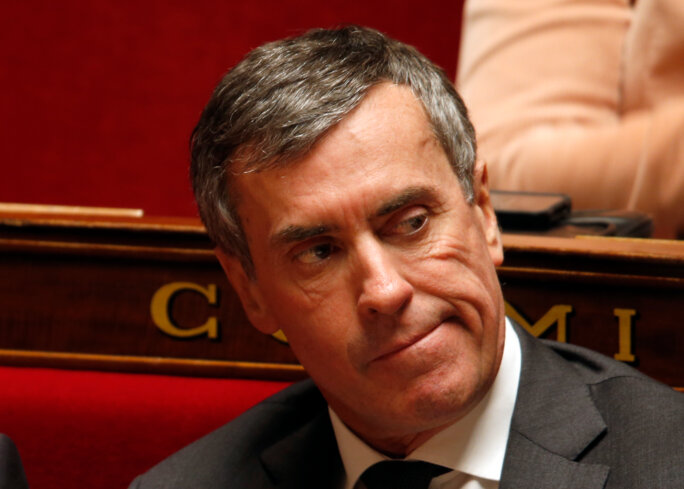Former socialist budget minister Jérôme Cahuzac, who was sentenced in December 2016 to three years in prison for tax fraud and money laundering the proceeds of tax fraud, brought his appeal against the conviction, which was heard over five days of hearings beginning February 12th, in an attempt to avoid serving time in jail, which he would automatically be spared in the case of a reduction of the sentence to two years or less.
By bringing his case to appeal, Cahuzac, 65, ran the risk of a lengthening of his initial sentence to a maximum seven years and a fine of 1 million euros.
The 65-year-old former plastic surgeon has not contested the findings of his first trial, when the prosecution detailed how he had hidden at least 3.5 million euros from the tax authorities over many years, using a foreign bank account, and the bank accounts of his wife and his mother. Instead, he has pleaded for clemency, admitting his failings but argued that he was made a scapegoat of by the political class, claiming he first opened his Swiss bank account in 1992 as a conduit for funding the political camp of the late socialist former prime minister Michel Rocard, a clandestine practice he said was common to French politics at the time.
“This money doesn’t belong to me,” he told the court last week, “and I always forbade myself from touching it.”

Enlargement : Illustration 1

A certain arrogance he displayed at his trial in 2016 gave way this month to a show of humility. “My whole life has been a series of accidents and coincidences,” he said, alternating repentance with the suggestion that the events that led to his trial were fate.
It was in April 2013 when Cahuzac finally confessed to holding the secret foreign bank account, which by then, 21 years after it was first opened, had been transferred from Switzerland to Singapour. After Mediapart first revealed its existence, in December 2012, Cahuzac, who as then-president François Hollande’s budget minister was then leading a crackdown on tax fraud, had continued over four months to vehemently deny the report, brazenly lying to parliament and in media interviews.
At this month’s hearing he said that when, as a socialist opposition MP, he became president of the finance commission of French parliament’s lower house, the National Assembly, in 2010, and when he later accepted his nomination by newly-elected Hollande in June 2012 as budget minister, it was because he was “in denial”. When the prosecution reminded him of his speeches and presentations championing a hardening of the fight against tax evasion, he replied that, “As soon as I accepted these posts, I had to do things properly”.
Cahuzac said he had become trapped in a spiral of lying, spoke of his thoughts of suicide after his tax evasion was unmasked, and about the difficulties that he now experiences in offering his unpaid services as a medic to NGOs operating abroad.
His lawyers produced a privately commissioned psychiatric report by Daniel Zagury, the chief psychiatrist of a psychiatric clinic in Bois-de-Bondy, a Paris suburb. Last week Zagury stepped up to the witness stand when he described Cahuzac as a person who was “responsible for his acts”, rational and rigid, but who said that Cahuzac was another man when committing fraud, a persona who Cahuzac had locked away during his later political life. “He holds on to the idea that it is not the political figure who commits fraud, that the political man is irreproachable,” said Zagury, describing it as “the Cahuzac paradox”. According to the psychiatrist, Cahuzac lied about his hidden assets “because he thought he had washed the stain by being at the service of the State”, even adding that he was “incapable of trickery”.
On Tuesday this week, the lawyer representing the French state and the General Directorate of Public Finances, Xavier Normand-Bodard, detailed the mechanism of the tax fraud and money laundering by Cahuzac and his estranged wife Patricia – who has not appealed the two-year prison sentence she was handed at the first trial in December 2016. Normand-Bodard said the amount of tax that the couple escaped paying over the three years up until 2013 (although their tax evasion lasted at least two decades, most of that period now falls under the statute of limitations) totalled 453,000 euros, excluding penalty payments.
The prosecution services’ financial crime branch, the PNF, estimates that the couple hid at least 3.5 million euros from the tax authorities, made up of 600,000 euros in Cahuzac’s secret foreign bank account, 2.7 million euros in hidden bank accounts in the name of Patricia Cahuzac, and another 239,000 euros that were discovered to have been paid into an account held by Jérôme Cauzac’s mother. That total does not include other suspect sums of money spent by the couple to fuel a lavish lifestyle.
'I beg you, don’t send him to prison'
It was also on Tuesday that the prosecution summed up its case. Chief prosecutor Jean-Christophe Muller described “the total confusion in the mind of Jérôme Cahuzac regarding his own situation”, denouncing an attitude of “wanting anything and everything”, which he said was to obtain financial, political, family and personal success, and to commit fraud while publicly condemning fraud. “At a certain point, choices must be made,” he said.
Muller said Cahuzac’s path in life was explained by a “feeling of impunity”, and the explanations Cahuzac gave for his failings were unconvincing. “To believe that it would be a pity to deprive France of such political talent, all the while involved in little dealings, is the world of the past,” he said. “It’s Mazarin, it’s Fouquet.”
Cahuzac stared fixedly at the floor when the chief prosecutor underlined that he could, on appeal, in fact see himself handed a maximum sentence of seven years in prison and a 1-million-euro fine. Muller cited recent cases of a fixed prison term handed to political figures found guilty of tax fraud in Italy, Germany and Spain.
He said Cahuzac was a fraudster “like Rastignac”, and compared his estranged wife to Madame Bovary. “The events might have continued were it not for the article by Mediapart in December 2012,” he added.

Enlargement : Illustration 2

Muller underlined that even if there was, in part, a political funding motive – which has not been proved and remains uncertain – to his secret account, Cahuzac in April 2010 hid 115,000 euros he received for several hair transplants he carried out abroad, at a time when he was an MP and when international legislation to lift banking secrecy had been hardened. He cited also the “pathetic scene in 2011” when, it has been established, Cahuzac, then president of the National Assembly finance commission, met with a courier in a Paris street who delivered him with 20,000 euros in cash from his hidden funds in Singapore.
Muller said that Cahuzac had made no move to settle his dues to the tax office until his fraud was unmasked, reminding the court that in 2009 the voluntary declarations from individuals who admitted previous tax payment irregularities brought in 8 billion euros to the public purse. “Tax fraud costs between 60 [billion] and 100 billion euros per year in France,” the prosecutor added, “while the annual budget deficit is between 70 [billion] and 80 billion euros.”
At the end of his summing up, Muller said the sentence should be “proportionate to the gravity of the crime, the situation of the person and the motives that guided him”, adding that while the first two criteria were clear, the motive had “only been touched upon”, asking “how can one not see here only greed?”
While Patricia Cahuzac had committed fraud involving bigger sums than her husband, Muller argued that the responsibility of her husband in the couple’s crime was greater, and that, because of the public duties he held, the case had grave consequences for social order and a severe effect on society. The prosecutor claimed that the public hatred of Cahuzac is because he has not had to pay for his crimes.
As for Cahuzac’s fear of prison, which the former minister cited as the reason for his appeal, Muller pointed out that “68,000 people, and as many families, suffer that ordeal”, in a reference to the numbers of people serving time in French prisons, and asked the presiding magistrates to confirm his first sentence of three years in prison and a five-year ban on holding public office.
“Your biggest contribution to the fight against tax fraud will not have been your actions as a Member of Parliament, as president of the finance commission, or as a minister,” Muller concluded. “It will have been your trial.”
For his defence, Cahuzac’s lawyers argued that the article in French tax law legislation on the subject of tax fraud is contrary to the European Convention on Human Rights, and that the case before the court involves only money laundering committed by the couple between 2010 and 2013, whereas the prosecution also cites offences in 2009.
On Thursday, one of Cahuzac’s two lawyers, Jean-Alain Michel, who is alos a personal friend of the former minister, chose to talk about “the other Jérôme”, he who had been a surgeon, a ministerial advisor, an elected politician and a minister, who served the general good, and who had “already paid a lot” and who is today “a man who is finished, broken, smashed”. The “just sentence” he told the court, would be that which allows Cahuzac to “win himself back, that which authorises a future”.
Cahuzac’s other counsel, Éric Dupond-Moretti, a gruff-speaking, high-profile criminal lawyer, argued that there was no legal necessity for sending his client to prison. “His reinsertion is already a given,” he told the court, adding: “And what if he topped himself in jail?” Dupond-Moretti read out a list of recent cases of suspended prison sentences handed to well-known figures for tax fraud, and referred to those also who had never been prosecuted, including the late l’Oréal cosmetic firm heiress Liliane Bettencourt and the late French rock star Johnny Hallyday.
In a reference to the national tribute paid to Hallyday after his death from lung cancer last Deember, when President Emmanuel Macron joined mourners at the religious ceremony in Paris, the lawyer said: “A national homage was paid to one of our celebrities who all his life looked to change countries in order to pay less taxes.”
“If he [Cahuzac] had gone to regularise his situation [of his tax dues],” argued Dupond-Moretti, “it would have been a professional suicide.” An unsuspended prison term, he said, should only be pronounced only as a last resort according to what he claimed was a legal principle for cases brought before a magistrate’s court. Calling for a sentence of less than two years, which would automatically be suspended subject to Cahuzac wearing an electronic tag and placed under judicial surveillance, Dupond-Moretti made an impassioned plea to the panel of magistrates: “I beg you, don’t send him to prison.”
The court announced it will return its verdict on May 15th.
-------------------------
English version by Graham Tearse


